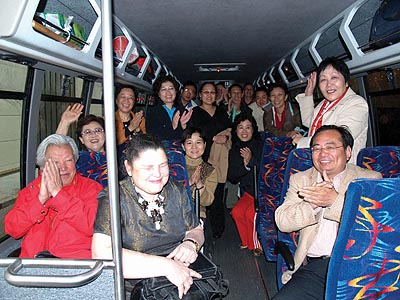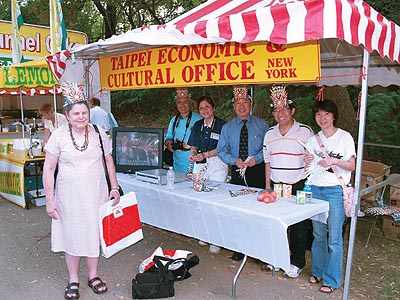| |
It had taken some convincing,
but I finally got a South American housemate to
accompany me to the September Pittsburgh Dragon Boat
Festival. I later learned that he was not so much
interested in the dragon boats or the Chinese food
as in getting to know me better. As events turned
out, he was not the only one who had this idea.
Somehow in the process of finding out how to get
something to eat, I overheard some people speaking
Chinese and introduced myself. Another woman, who
turned out to be Amy Pu, a journalist and editor of
the Erie Chinese Journal, joined the conversation.
She told me she would like to write about me, so we
exchanged phone numbers. I was surprised that she
actually called, however, and agreed to meet with
her. I told her about myself and showed her whatever
pictures I could find which chronicled the various
important phases of my life. Since that time, I have
appeared in a number of articles in the Chinese
newspaper. I had thought there were only two until
one of my Chinese friends whom I see infrequently
told me she had kept up with me through the articles
in the Chinese paper. Ms. Pu usually calls me to
tell me when she is coming from Cleveland to
Pittsburgh . Times and dates often change with
little notice, and when we meet, I have learned to
be ready for just about anything interesting. When
we part, I usually have enough left-over food from a
restaurant dinner to last for several days, and the
knowledge that there are several more people I’d
like to get to know better. Shortly after we met,
she asked me to sing some Chinese folk songs at the
closing ceremony of a soccer game between Pittsburgh
and Cleveland Chinese teams which I didn’t even know
existed.
.jpg)
There are two occasions I will never forget. One was
the lunar New Year dinner I had at my home. I was
supposed to talk about my philosophy of life in
Chinese and feed a bus load of people one Sunday
afternoon last February. The challenge for me was
having dinner for 40 people hot and ready to serve
after my talk. Usually on such occasions I am
bustling about the kitchen until the last moment.
This time I chose a menu of three dishes which could
be kept warm for hours without harm, and also baked
cakes, pies and cookies. Miss Pu was concerned that
I wouldn’t have enough food, or that the Chinese
people couldn’t handle my American cooking, and
brought enough food from a local restaurant to fee
our household of ten for weeks afterward. The other
challenge was my lecture, which had had me worried
for weeks, since I’m not sure my Chinese is up to
the task. I never even got to the lecture, because
after I had sung a few songs in various languages
and answered a few questions, I was informed that a
few people needed to leave and we had to eat
immediately. Everyone left after dinner except the
Pittsburgh Post Gazette reporter, who stayed for
quite some time asking me questions about my life
and the various problems I have had to face as a
result of my blindness. The result of this day was a
newspaper article which still draws comments from
strangers at bus stops.

The other event was last Memorial Day when I was the
guest of Mrs. Pu and her family for the weekend.
There were several occasions for singing, the most
notable of which was the program which was supposed
to be a celebration but which turned out to be a
benefit for victims of the recent earthquake in
Sichuan province. One of the participants was a
group of Mongolian singers. Since I had spent time
teaching in Inner Mongolia , I wanted to sing them a
Mongolian song which had not been on the program.
This brought a spontaneous reply from their side,
and several songs were exchanged. The next morning,
Mrs. Pu accompanied me to breakfast at the hotel
where the group was staying. Since several
stragglers had not boarded the bus, I climbed into a
front seat and sang several more Mongolian songs in
Chinese. The feeling of friendship felt strong
enough to touch, and I left with a special Mongolian
scarf which had been given to me the previous night
at the concert. In all these exchanges, Amy Pu and I
have become close friends. I think I could safely
say that each of us knows things about the other
that we would not like to read about in newspapers.
I look forward to deepening friendship in the coming
years as well as more fun and adventure.
|
|
|
2006年,在匹兹堡一年一度的龍舟節里,我認識了盲人凱文,當時她在參觀中國禮品攤位,我聽到她用一口純眞的普通話在問價,我十分好奇,便跟她打招呼,我們很快聊起來,後來我每一次去匹兹堡送報紙只要有時間就想去看她,一晃二年了,我們成了很好的朋友.

.jpg)
2007年暑假,她已經準備好去西安敎中文,沒有想學校臨時説取消了,她打電話要我幫忙,我説給我幾天時間,最後在李敏儒的幫助下她順利去了武漢.就在她回家我請她吃飯的時候,我吿訴她匹兹堡實在太難生存了,我説我沒有士氣再繼續做,她説那你就不來看我了,我看着她幾乎要哭的樣子,急忙説我繼續送,因爲匹兹堡我有一群難得的朋友.
凱文她活得自在,正常人能做的她能做,正常人不能做的她也能做,她對我説,在你的生活里要記住五點:時間:珍惜分分妙妙。勤奮:努力要求上進。能力:學習探索經驗。原諒:諒解善待別人。錯誤:容許自己犯錯誤。從錯中學,讓自己更有智慧。凱文是一個富有愛心樂于助人的美國人,她也是一位知識淵博的責任性很強的人,在她敎書的生涯中她曾經敎過數學,敎過宗敎;還敎過化學、物理學;敎過俄文、西班牙文、法文、英文。她業餘時間喜歡旅遊,喜歡看別的地方,看世界上的人怎樣生活。
凱文她是個盲人。她從小生活在黑暗中,命運給了她太多的艱難和坎坷,她曾痛苦、迷茫、彷徨,但她抗爭、奮鬥、崛起。也是從那以後,她學到了一個眞理:“雖然我折斷了翅膀,但我要用心靈去飛翔”,1966年,就考上了Stanford
University1968年她又繼續在 Harvard
University攻讀碩士敎育學,畢業後去過歐洲敎學,隨後到了匹兹堡,她和她的愛人建立了溫暖的家,後來她生了一女還領養一個非洲男孩.
“黑暗給了她黑色的眼睛,她注定要用它尋找光明。”盲人凱文在黑暗的世界里點擊命運,迎風沐雨,用堅強和樂觀尋找光明,展現笑容。她是一位天才,國內人看到她的事迹後稱他是天使,今天她在Pittsburgh
Gift
School敎俄語和中文。每天她的作息制度是早晨六點半起床,換二輛公共汽車到學校,她風雨無阻,一周還有三天固定參加合唱團排演,她能講十多種語言English,
Russian, Polish, Spanish, Portuguese, Latin, French, German,
Chinese, Thai, Hebrew, Swahili她是一個能令人興奮,給人力量,從她的笑聲中能讓你滿懷激情的人。
最後借用一句名言:生活給予每個人的都不會太少,只要你好好珍惜其中的一二,並不斷用心血去打造,你就能擁有生命的芬芳,因爲這個世界上所有的人都擁有二十四個小時.
.jpg)
凱文説她太喜歡她剛裝修的新廚房,尤其是她放做她糕點的打面機,認識凱文對我來説是一比財富,她對生活的熱情我敬佩不易,而她喜歡用一句俄羅斯諺語勉勵我"Work
is not a bear. It will not run away into the forest." That means
your work will still be there when you wake up. Juse use your time
as well as you can and things will somehow get done. |